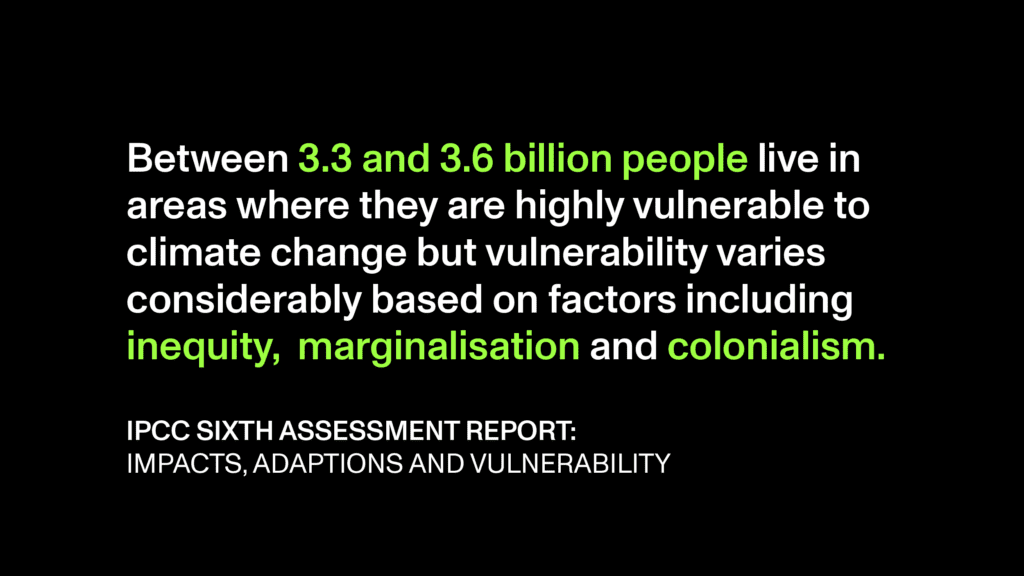Latest IPCC Report Reiterates the Importance of Intersectionality


February saw the release of the latest IPCC Sixth Assessment Report, focusing on: ‘Impacts, Adaption and Vulnerability’. The report positioned climate justice and equity at the forefront, emphasising the need for intersectional solutions and diverse knowledge inputs for adaption.
Environmentalism can no longer be recognised by an aspiration to defend ecosystems in the abstract future – climate change is unfolding before our very eyes and implicating the most vulnerable societies across our globe.
The science is crystal clear – current progress, promises, platitudes and plans are insufficient. The report does indicate that we have a brief window of time to take action to avoid the very worst impacts, but there is simply no time to waste.
Between 3.3 and 3.6 billion people – almost half the global population – live in areas where they are “highly vulnerable” to climate change. If warming exceeds 1.5°C in the coming decades, it will lead to severe and often irreversible risks and impacts to ecosystems and humans.
Everywhere is affected, with no inhabited region escaping the consequences of climate change, although the report explicitly outlines that vulnerability of ecosystems and people varies considerably based on factors including inequity, marginalisation, colonialism and governance. For example, though the continent of Africa has contributed some of the least greenhouse gas emissions, it is already experiencing “widespread loss and damage” due to climate change. Specific to the fashion industry, the European Environment Agency’s recent textile briefing indicated: “80% of environmental impacts generated by Europe’s textile consumption takes place outside Europe.” Countries outside of Europe are bearing the brunt of Europe’s often insatiable consumption habits.
– Current adaptation and its Benefits
Adaption entails changing lifestyles and infrastructures to essentially live with the changing climate. Whilst it is a necessity today, especially for particularly vulnerable groups of people, it should not encompass our end goal. The limits of adaption will soon be met if we don’t accelerate efforts to mitigate climate change. There are, however, “feasible and effective adaptation options” which can reduce risks to people and nature.
To facilitate this, the report outlines the need to overcome ‘soft’ limits and address financial, governance, institutional and policy constraints – reiterating the salience of policy in transformation. Furthermore, the report emphasises the urgency of not only “political commitment” but crucially, “follow-through” – insufficient and vague promises will not suffice. Hard limits to adaptation have been reached in some ecosystems.
– Climate Resilient Development
The resounding message is that climate-resilient development is enabled when governments, civil society and the private sector work together and make inclusive development choices.
Cooperation is needed between governments and communities, civil society, educational bodies, scientific and other institutions, media, investors and businesses. Crucially partnerships must be developed with traditionally marginalised groups, including women, youth, Indigenous Peoples, local communities and ethnic minorities.
The report demonstrates that climate change and its repercussions are not one-dimensional issues, and there are many different variables at play. We all must stand in solidarity with those most vulnerable to harrowing environmental hardships and advocate for an intersectional approach to environmentalism.
“Intersectional environmentalism, a term largely inspired by Professor Kimberlé Crenshaw and her work with intersectional feminism, is an inclusive form of environmentalism that advocates for the protection of all people and the planet. It identifies the ways in which injustices affecting marginalised communities and Mother Earth are interconnected.” – Intersectional Environmentalist
Much of what has been said, including the vulnerability of certain groups and the irreversible risks that climate change is posing, we already knew. The report substantiates this knowledge. The intricate web of issues that emerge as a result of climate change is complex and can be overwhelming, but we cannot expect to better our understanding without listening to the voices of the communities on the front lines of the climate crisis.
Human interactions with the environment, be that as groups or as corporations, are both the cause of many environmental complications and likewise the only way to formulate a solution. Agency is always involved with planetary interaction and as a result, we can feel empowered to know that collectively the fashion industry can form strong alliances to change the current trajectory.
The fashion industry is uniquely positioned to impact many of the areas that the report covers – its operations take place around the globe. Going forward we must not only prioritise emissions reduction, but inform policymakers to equip them for appropriate legislation, and ensure all activities are inclusive and equitable.
The UN established group, The Intergovernmental Panel on Climate Change, publishes a report every six to seven years, which is released in three instalments. The first of this iteration was released in August 2021 outlining the state of the physical science of climate change and the latest was released last month, detailing the vulnerability of ecosystems and human societies to climate change and potential options for adaption. The final report coming in April will suggest what can be done to mitigate climate change.
Since the 2014 edition of the report, the rhetoric has shifted from projections about how climate change might manifest, to observations about how it has already occurred.